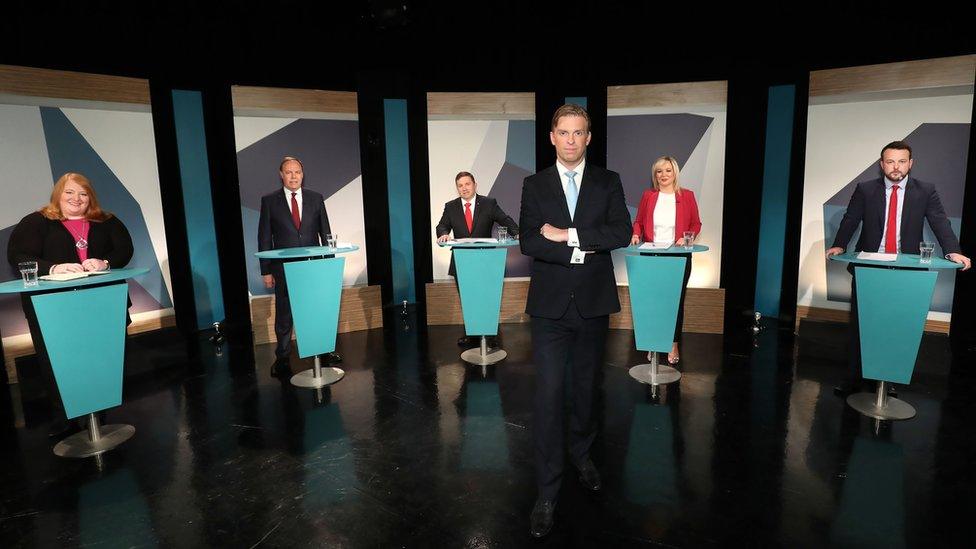Leaders clash on terrorism and Brexit at UTV election debate
- Published

The debate began with the politicians condemning the recent terror attacks in England
Leaders of the Stormont parties have clashed over condemnation of terrorism and how to respond to Brexit.
The recording of Monday night's UTV election debate had to be stopped half way through, when Alliance leader Naomi Long became unwell.
Mrs Long felt faint but, after a short pause, was able to resume her place alongside the other party leaders.
The debate began with the politicians condemning the recent terror attacks in England.
Ulster Unionist leader Robin Swann welcomed Sinn Féin's condemnation of the attacks - but added that he wished they would also condemn previous IRA bombings.
'Glorification of terrorism'
"We have to look at is an integrated intelligence-gathering operation that can truly tackle the terrorism at the root base and also look at tackling the radicalisation of our young people," he said.
"That is where the real challenge is coming and to stop the glorification of terrorism.
"That is why I welcome Sinn Féin's ability to condemn these bombs in London and Manchester and I wish they would do the same for the other bombs that happened as well."
Sinn Fein's Michelle O'Neill said parallels should not be drawn between international extremism and what had happened in Ireland.
She criticised the DUP over a recent endorsement it received from a group linked to the paramilitary Ulster Defence Association (UDA).
Alliance leader Naomi Long argued it was tasteless of politicians in Northern Ireland to immediately bring the debate about the attacks in Manchester and London back to their arguments over the Troubles.
"It doesn't take long for the focus to move from the people who have actually suffered in London and Manchester back to the normal mudslinging that we get in Northern Ireland politics," she said.
"Most people will find that pretty tasteless."
On Brexit, the DUP's Nigel Dodds brandished a letter signed by the late Martin McGuinness to back up his argument that Sinn Féin has changed its stance.
Border poll
Mr Dodds said the letter, co-signed with Arlene Foster, made no mention of the special designated EU status which both Sinn Féin and the SDLP currently propose.
"This is one of the ironies about all this talk of special status because that letter did not contain a mention of special status," he said.
Nationalists clashed over Sinn Féin's refusal to sit at Westminster.
Sinn Féin leader Michelle O'Neill again argued that MPs who take their seats have achieved nothing in stopping Brexit.
"What's so important is how you use your mandate and where you provide the representation," she said.
"We take representation to where it counts. None of the other parties have been able to stop or even influence anything to do with Brexit."
However, she was strongly challenged by SDLP leader Colum Eastwood who said that his MP, Mark Durkan, had played a key role in establishing that Northern Ireland could automatically become a part of the EU if it joined the Irish Republic after a future border poll.
"This is the most important election we have seen in a long, long time," said Mr Eastwood.
"If Sinn Féin get their way we won't have one progressive anti-Brexit voice in the Westminster parliament, we won't have one nationalist there. That is what the response from Sinn Fein's strategy will be. Nobody there at all."